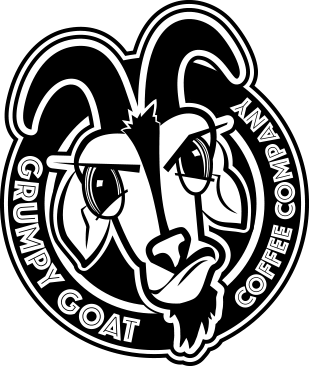4 Ways Coffee is Similar to Wine
When we meet coffee lovers at farmers markets, microbreweries and other special events, we have fun talking and answering questions about coffee.
A comparison we often make that is relatable is wine. Much like wine enthusiasts seek out highly-rated wines to try, they also appreciate the aroma and tasting notes of the best coffee on the planet.
Here are four ways that the coffee and wine experience are similar.

1. Scoring
Most people we speak with don’t realize that coffee is scored on a 100 point system. This is similar to the wine industry. When you visit a wine store the point score that a wine has earned is usually prominently displayed on the shelf tag.
Expertly trained and licensed professional “cuppers” grade the coffees. These very skilled individuals have completed testing requirements much like the Master Sommeliers in the world of wine.
After undergoing rigorous evaluation, coffees scoring 86 points and above (Grumpy Goat only selects beans rated 86 points or higher) can be categorized as “Specialty Coffee.” This designation applies to only 1% of the world’s coffee.
But the similarities between coffee and wine go beyond the scoring system.
2. Terroir
Wine requires growing grapes and coffee requires growing beans.
France and Australia are famous for their wine making. Countries like Ethiopia and Kenya are considered the most ideal growing regions for specialty coffee. The highest quality coffee beans and grapes are produced in special microclimates within these larger regions.
Perhaps the most magical thing that impacts both beverages are the environmental characteristics in which the grapes and beans grow.
Soil, altitude and climate factors like sun exposure (i.e., a growing region’s terroir) all contribute to the unique flavor, tasting notes and aroma of what ultimately becomes your glass of wine or cup of coffee.
3. Tasting Notes
The use of flavor profiles are one of the most obvious similarities between wines and coffees. Both beverages exude a unique bouquet of aromas, textures and tasting notes.
Finish and acidity are also characteristics commonly used to describe these beverages.
The roasting process impacts the coffee much in the same way that wine making choices in the cellar will affect the final outcome of a wine.
Grumpy Goat spends a lot of time researching coffee beans available around the world. We learn about the flavor profile of the coffee and craft a roasting that will allow the flavors of the beans to come through at their finest.
The similarities between wine and coffee don’t stop there.
4. Serving
Fans of both coffee and wine each have their own rituals for preparation and serving too. When wine enthusiasts uncork a bottle, they serve it at the right temperature. They decant the wine when necessary. They even use specific types of stemware designed to capture the bouquet of the wine.
Similarly, coffee lovers embrace their own favorite serving methods. For instance, the brewing method and device used to make the coffee is a highly personal preference.
Grumpy Goat will grind your coffee to any level of coarseness or fineness if you don’t have your own grinder.
Just like it matters to properly prepare and serve wine, it is important to properly prepare and serve coffee to experience the best cup possible.
Now that you see ways that coffee and wine are similar you’ll never taste a cup of coffee the same way again. Being inquisitive about how a coffee scores, the uniqueness of the growing region, the tasting notes and how they’re impacted by the preparation and serving will allow you to be an enlightened coffee enthusiast.


